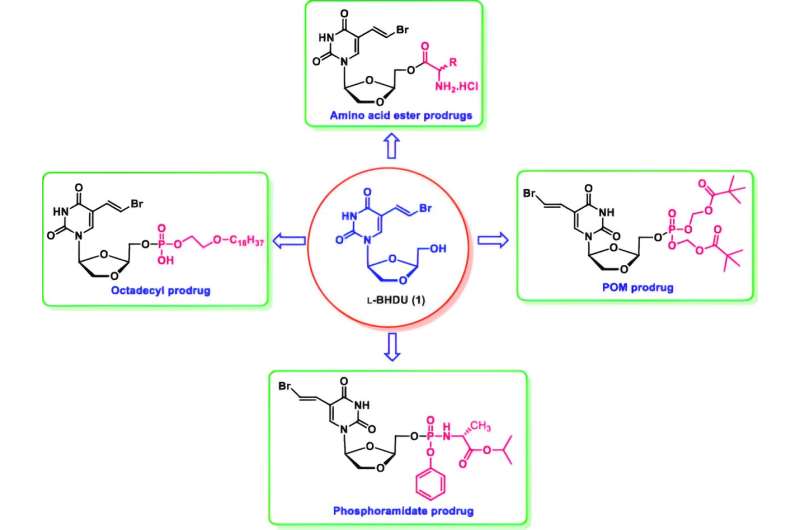This article has been reviewed according to Science X's editorial process and policies. Editors have highlighted the following attributes while ensuring the content's credibility:
fact-checked
peer-reviewed publication
trusted source
proofread
New molecule could treat shingles, herpes viruses

You've seen the commercial. The one that ominously tells you if you had chickenpox as a child, the virus that causes shingles is already inside you.
It's creepy, but it's also a good way to prompt people to get the shingles vaccine. Unfortunately, the shot doesn't always keep you from getting shingles. It just mitigates the symptoms.
That's why University of Georgia researchers David Chu and Uma Singh have developed and patented a molecule to serve as a potential treatment for the varicella zoster virus, the type of herpes that causes both chickenpox and shingles.
A new study published in the Journal of Medicinal Chemistry found the molecule can effectively treat the uncomfortable lesions that accompany shingles and suggests the molecule may also work against the viruses that cause oral and genital herpes.
"Many viruses are becoming drug-resistant to the current medications on the market," said Uma Singh, lead author of the study and a lecturer in UGA's College of Pharmacy. "There is a continuous need for new molecules, and the one we developed, called POM-L-BHDU, shows much more potency against the virus than current ones."
The researchers also found that the molecule is safe for treating varicella zoster virus in cancer patients.
Additionally, the molecule can be applied topically in addition to being taken orally or intravenously, making it a great option for a future cream-based medication for both shingles and other herpes outbreaks.
No effective treatments exist for herpes, shingles viruses
While several drugs are on the market to treat the viruses caused by the varicella zoster virus, they aren't particularly effective or can have potentially life-threatening side effects.
For example, cidofovir is an antiviral commonly used for viral eye infections and used off-label to treat warts and herpes. But it can accumulate in the kidneys and potentially cause them to fail in severe cases.
A topical medication using the patented molecule can better target localized outbreaks, preventing the virus from spreading to other areas of the body. Topical medications also limit the amount of a drug that is absorbed into the bloodstream and cut down significantly on side effects.
"We want to develop this as a broad-spectrum molecule," Singh said. "It acts against both the varicella zoster virus and herpes simplex 1 and 2 viruses. For patients who want to take it in capsules, they could. Those who want to take it intravenously, they could. And those who want to use it topically, they can easily apply it at home."
The researchers hope the topical formula will be sold over the counter, enabling patients to easily access treatment in the privacy of their own homes without needing a prescription.
Molecule shows success against viruses in multiple models
The molecule has already proven effective in vitro and in vivo mouse models.
Topical studies on adult human skin indicate that POM-L-BHDU, 0.2% formulated in cocoa butter is highly effective against both herpes simplex 1 and the varicella zoster viruses. (These results are currently unpublished.)
The next step is to get the molecule into phase 1 clinical trials, something Singh hopes will happen in the next couple of years.
"We want to push this project as soon as possible into large-scale synthesis," Singh said. "It has the potential to benefit society on a large scale."
Recently, the UGA Research Foundation has licensed this molecule to a company called Anterogen Co.
More information: Uma S. Singh et al, Prodrug Strategies for the Development of β-l-5-((E)-2-Bromovinyl)-1-((2S,4S)-2-(hydroxymethyl)-1,3-(dioxolane-4-yl))uracil (l-BHDU) against Varicella Zoster Virus (VZV), Journal of Medicinal Chemistry (2023). DOI: 10.1021/acs.jmedchem.3c00545















